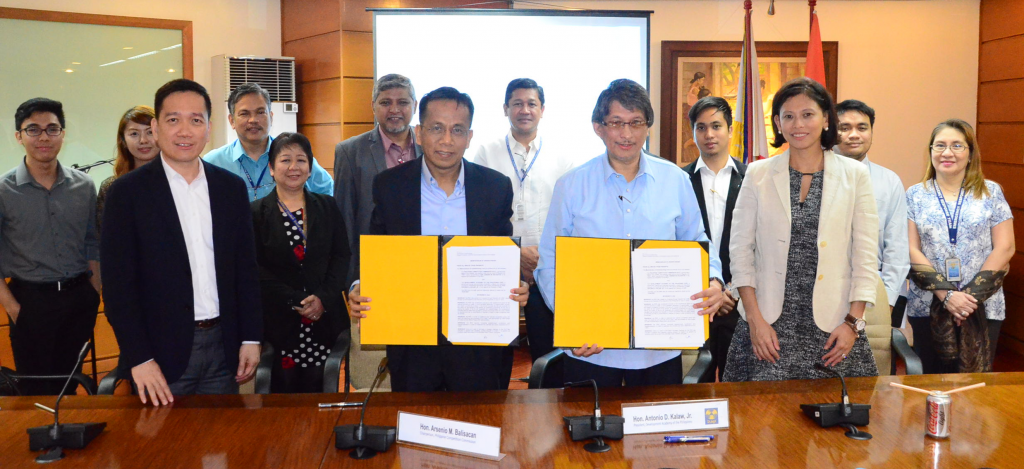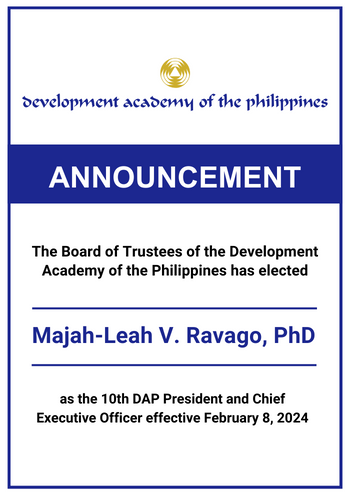
The name implies something akin to sports, but make no mistake, the newly-minted government agency called Philippine Competition Commission is not in any way related to the Games and Amusements Board or even the Philippine Sports Commission. It is an agency concerned more with pursuing constitutional goals related to the national economy, not any medal or trophy in the Olympics or any other international sports competitions.
Pursuant to its mandated goals, the PCC recently signed a memorandum of understanding with the Development Academy of the Philippines in a partnership envisioned to provide the new agency a blueprint for its programs, and thus a successful springboard to realizing its goals.
The signing took place last February 15 at the DAP Headquarters in Pasig, with recently-resigned National Economic and Development Authority Director-General Arsenio M. Balisacan signing for the PCC as its newly-designated chairperson and Antonio D. Kalaw Jr. doing it in behalf of the DAP as the Academy’s president.
Development partner
The agreement designates the DAP as the PCC’s “development partner in the conceptualization, implementation, and monitoring” of the agency’s “capacity and capability-building program” through the performance of relevant activities that cover the PCC’s institutional and specialized programs.
These programs include providing space to the new agency during its initial operations, assisting it in the procurement of materials and equipment as well as in institutional compliance, along with providing assistance in the formulation of its implementing rules and regulations, developing a strategic plan, undertaking organizational development initiatives and other activities, including staff development, compliance and monitoring projects and specific programs and projects necessary to achieve the objective and policy design of the PCC.
Great track record
Kalaw has cited the DAP’s “great track record” in institution building as proven by the many agencies and bodies that saw birth or became a spinoff of one of its programs and developed into full-fledged institutions under its aegis. These include the Housing and Land Use Regulatory Board (HLURB) whose trail-blazing forerunner, the Human Settlements Commission, had its seeds planted at the DAP, the Career Executive Service Board (CESB), the Foreign Service Institute (FSI), the Energy Regulatory Commission (ERC), and the Presidential Commission on Good Government (PCGG).
The PCC entered into its partnership with the DAP precisely because of this “expertise” that it recognizes, and it now expects an auspicious start with the Academy hand-holding with it.

Academy as host
Kalaw had earlier told Academy officials and staff that the PCC shall eventually be occupying the Ground Floor of the institution’s headquarters once it is Ground Floor of the institution’s headquarters once it is vacated by the Philippine Health Insurance Corporation, whose lease on the space expires this March. The PCC now occupies office spaces at the Onofre D. Corpuz Hall at the 6th Floor of the Academy’s headquarters in Pasig.
The PCC was created by Congress through Republic Act 10067 that President Benigno C. Aquino III signed into law on July 21, 2015. The agency was constituted “pursuant to the constitutional for the national economy to attain a more equitable distribution of opportunities, income, and wealth.”
This would be attained by sustaining an increase in the amount of goods and services produced by the nation for the benefit of the people, expanding productivity as the key to raising the quality of life especially of the underprivileged, and ensuring the observance of the constitutional mandate that the State shall “regulate or prohibit monopolies when the public interest so requires and that no combinations in restraint of trade or unfair competition shall be allowed.”




